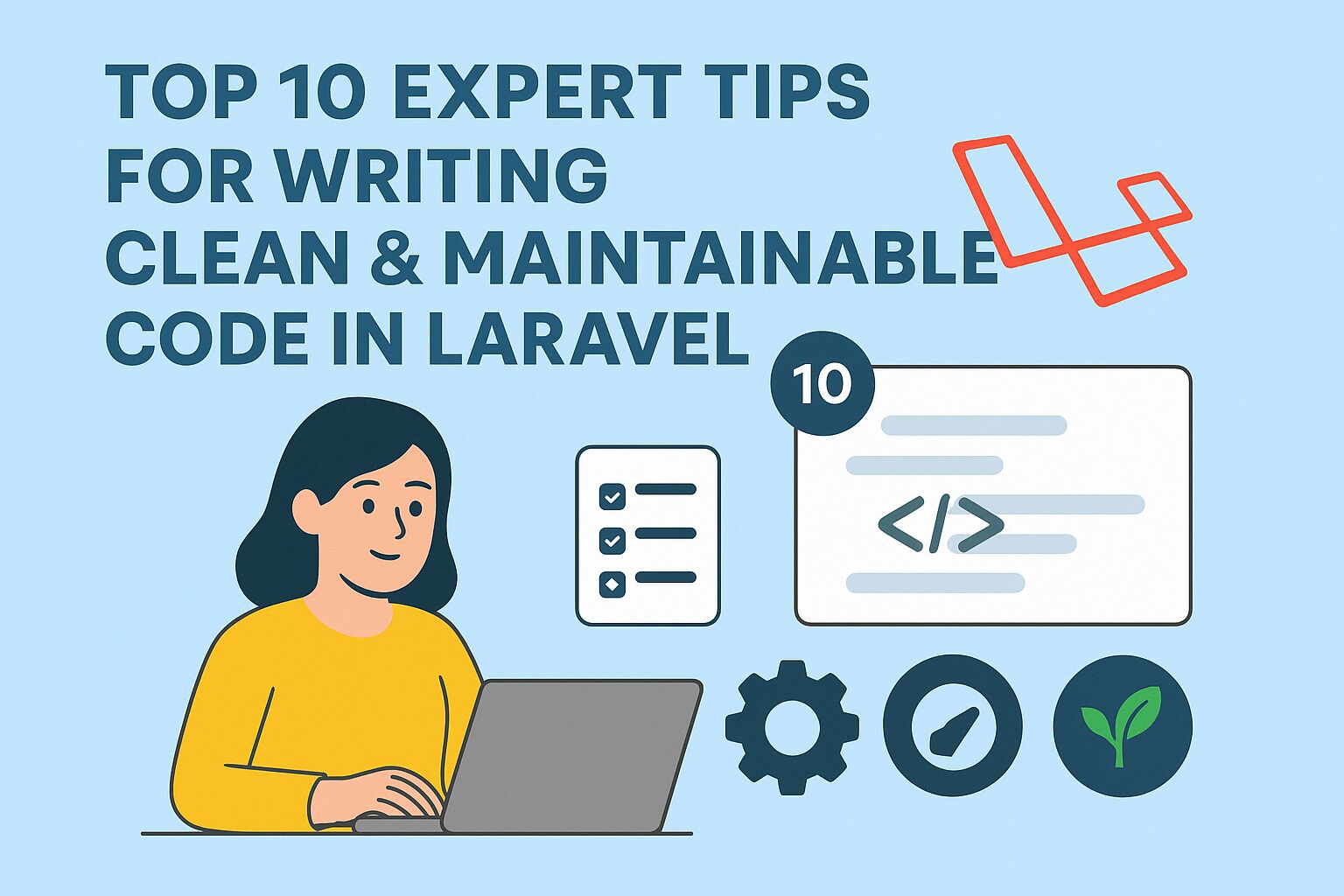
Top 10 Expert Tips for Writing Clean & Maintainable Code in Laravel
Writing clean and maintainable code is very
important in Laravel. It helps in making the project easier to understand and
update. Good code reduces bugs and improves performance.
When code is clean, other developers can
easily work on it. Laravel offers many tools to help write clean code. Best
practices must be followed to keep the code organized. It is recommended that
code should be simple and clear.
Complex code makes the project difficult to
maintain. Proper use of Laravel features improves code quality.
Read this article by one of the best web design & development companies in India
that explains how clean and maintainable code can be written in Laravel using
easy steps.
Use Meaningful Names for Variables and Functions
Meaningful names are chosen for variables
and functions. Code is made easier to read by clear names. Confusion is avoided
when names describe their purpose well. Good names are picked before writing
the code.
Variables are named to show what data they
hold. Functions are named to explain the task performed. When other developers
read the code, understanding is improved. Time is saved by not guessing the
meaning of names.
Errors are reduced because the code is
clear. It is recommended that abbreviations are avoided in names. Clean code is
created when meaningful names are used.
Follow the PSR Coding Standards
PSR coding standards are followed to keep
code consistent. Code style rules are defined by these standards clearly. When
PSR standards are used, code is easier to read. Different developers can
understand the code without confusion.
Errors caused by inconsistent code are
reduced greatly. Formatting, naming, and structure rules are included in PSR.
Code is automatically checked using tools following these rules. It is
recommended that PSR-12 is used for Laravel projects.
When standards are followed, maintenance is
simplified for future updates. Good habits are formed by using these coding
guidelines. Clean and professional code is ensured by following PSR.
Separate Business Logic from Controllers
Business logic should be separated from
controllers in Laravel. Controllers are kept simple by placing logic elsewhere.
Services or models are used to hold business logic. When logic is separated,
code becomes easier to manage.
Changes in business rules are made without
touching controllers. Testing is simplified when logic is isolated in one
place. Code duplication is reduced by reusing business logic properly.
Controllers focus only on handling requests
and responses. Clear separation of concerns is encouraged for clean code.
Maintenance is made easier by dividing responsibilities clearly in code.
Use Eloquent ORM Properly for Database Operations
Database operations should be handled using
Eloquent ORM. Queries are written in a simple and readable way. Complex SQL
queries are avoided by using Eloquent methods. Data retrieval and manipulation
are done through model classes.
Relationships between tables are defined
clearly in models. Code readability is improved when Eloquent is used properly.
Raw queries are only used when absolutely necessary.
Database logic is kept inside models for
better structure. Code errors are reduced by using Laravel’s ORM features.
Performance is improved when queries are
optimized in Eloquent. Clean and maintainable code is ensured by proper ORM
use.
Write Small and Focused Methods
Small and focused methods should be written
in the code. Each method is designed to perform one clear task. When methods
are small, they are easier to understand. Code errors are reduced because tasks
are clearly separated.
Methods are reused more easily in different
parts of code. Testing is simplified by focusing on single method behavior.
Complex methods are broken down into smaller, simpler parts.
Code readability is improved by using
descriptive method names. Maintenance is made easier when methods do only one
thing.
Clean code is achieved by writing small,
focused methods regularly.
Use Laravel’s Built-in Validation for Input Checks
Input validation should be done using
Laravel’s built-in features. Validation rules are defined clearly in controller
or request classes. Data is checked automatically before it is processed
further.
Errors are caught early and handled
gracefully for users. Validation logic is not repeated in multiple places. Code
duplication is reduced by using reusable validation rules. Clean and consistent
validation is ensured throughout the application.
User input is protected from invalid or
harmful data. When built-in validation is used, bugs caused by bad data are
avoided. Code quality is improved by relying on Laravel’s validation system.
Add Comments Only Where Necessary
Comments should be added only when they are
needed. Code is explained clearly by using meaningful names first. When complex
logic is used, comments are added for clarity. Comments are written to explain
why the code works.
What the code does is shown by the code
itself. Unnecessary comments are avoided to keep code clean. Old or incorrect
comments are removed to prevent confusion. When comments are used properly,
code maintenance is made easier.
Documentation is improved by clear and
helpful comments. Code quality is increased by balancing code and comments
carefully.
Use Dependency Injection to Manage Class Dependencies
Class dependencies should be managed using
dependency injection. Objects are provided to classes instead of being created
inside. Code flexibility is increased when dependencies are injected properly.
Testing is made easier by replacing
dependencies with mocks. Tight coupling between classes is avoided by using
injection. Dependencies are clearly defined in constructors or methods.
Laravel’s service container is used to
resolve dependencies automatically. Code maintainability is improved by
separating class responsibilities clearly. Changes in dependencies are handled
without modifying the main code.
Clean and testable code is ensured by using
dependency injection. Best practices are followed by applying this design
pattern.
Avoid Hardcoding Values in the Code
Hardcoded values should be avoided in
Laravel projects. Configuration values are stored in environment or config
files. Changes in settings are made without modifying the code. Code is made
flexible by reading values from configuration.
Sensitive data like passwords are kept
outside the code. Values are accessed using Laravel’s config helper functions.
When hardcoding is avoided, deployment to different environments is easier.
Code duplication is reduced by reusing
configuration values. Bugs caused by inconsistent values are prevented
effectively. Clean and maintainable code is ensured by separating configuration
and code.
Regularly Refactor Code to Improve Structure
Code should be regularly refactored to
improve its structure. Problems and inefficiencies are found and fixed during
refactoring. Code complexity is reduced by simplifying logic and methods.
Duplicate code is removed to make
maintenance easier. Performance improvements are made by optimizing slow parts.
Refactoring helps keep the codebase clean and organized. New features are added
more easily after refactoring.
Bugs are prevented by improving code
clarity and design. Automated tests are run to ensure no errors are introduced.
Code quality is kept high by making
refactoring a habit. Clean and maintainable code is ensured through regular
refactoring.
Who We Are?
We are a leading Laravel Website Development Company in Delhi known for offering modern development solutions.
- Company Name - e-Definers Technology Pvt. Ltd.
- Add - 132, 2nd Floor, Mall Road, Kingsway Camp, GTB Nagar, Delhi 110009
- Call - +91 9999051533
- Email - info@edtech.in
- Website - https://www.edtech.in/
- Facebook - https://www.facebook.com/edefiners/
- Instagram - https://www.instagram.com/edefiners/
- Twitter - https://twitter.com/edefiner
- LinkedIn - https://in.linkedin.com/company/e-definers-technology
- Pinterest - https://in.pinterest.com/edtechwebdesign/
- YouTube - https://www.youtube.com/edefinerstechnology






